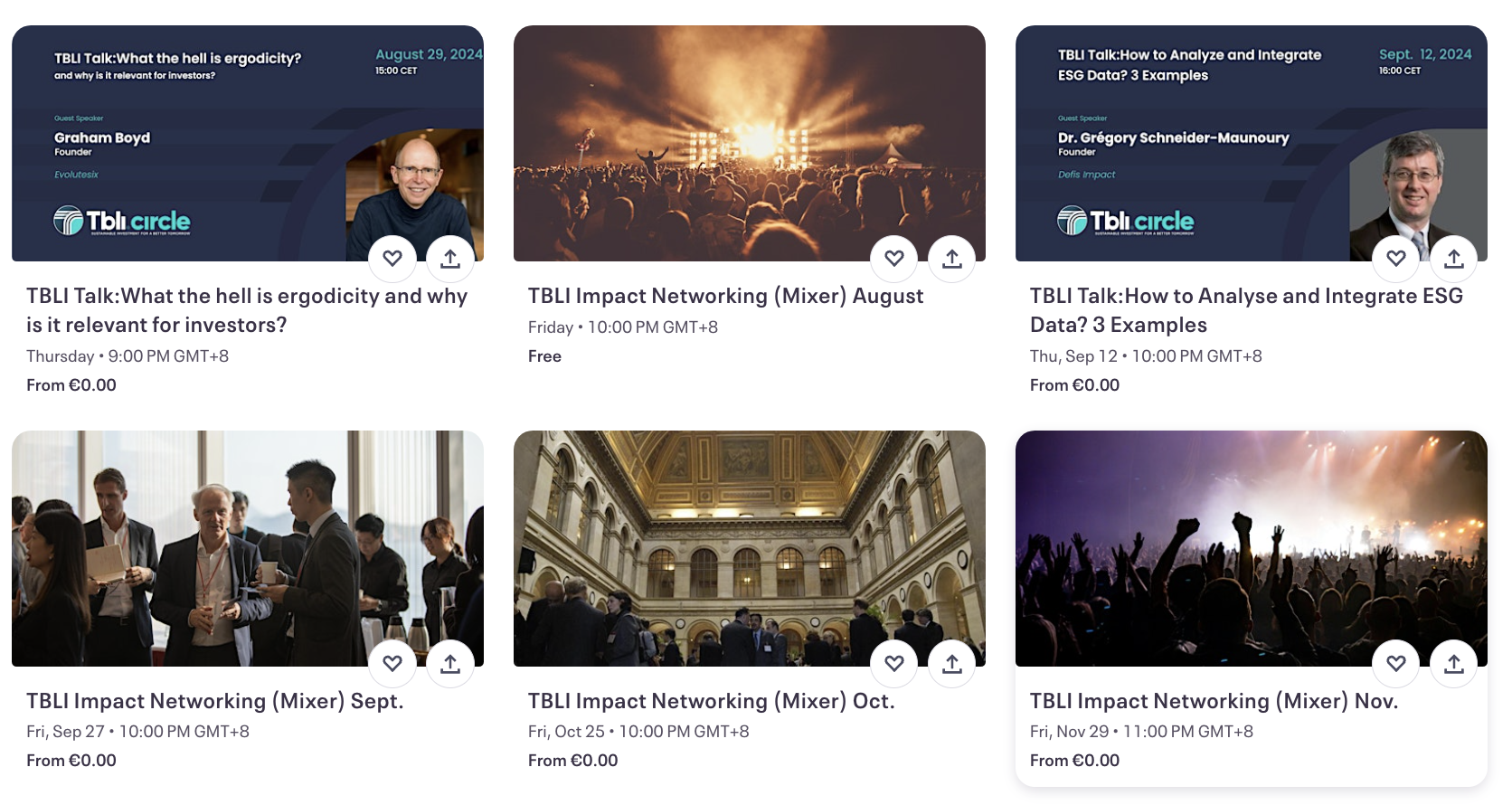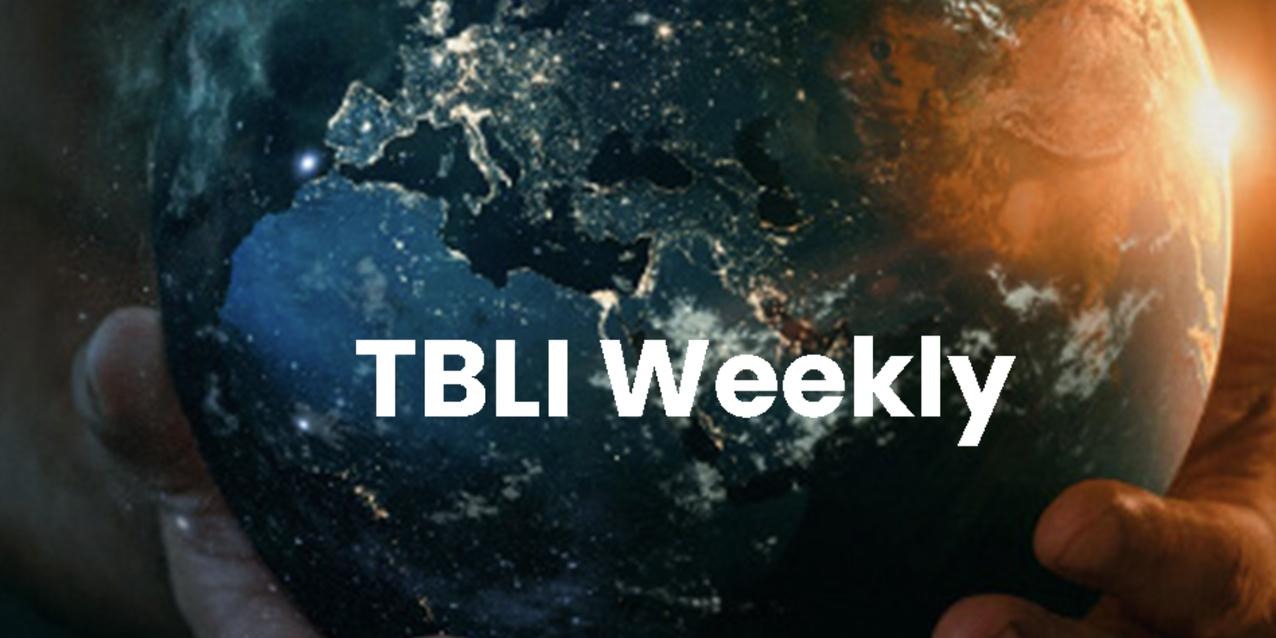
Upcoming TBLI Events
Would you like to watch a recording of a past TBLI Talk event? Visit this page
TBLI Capital Connect expansion
We've expanded our Capital Connect service so start-ups and companies without significant budget for fundraising efforts can tap into our extensive network of investors, and get connected to curated investor matches that are actively investing in your sector.
Are you currently looking to meet impact investors? This service might be just for you!
More info
Arrange call to learn more
TBLI Circle
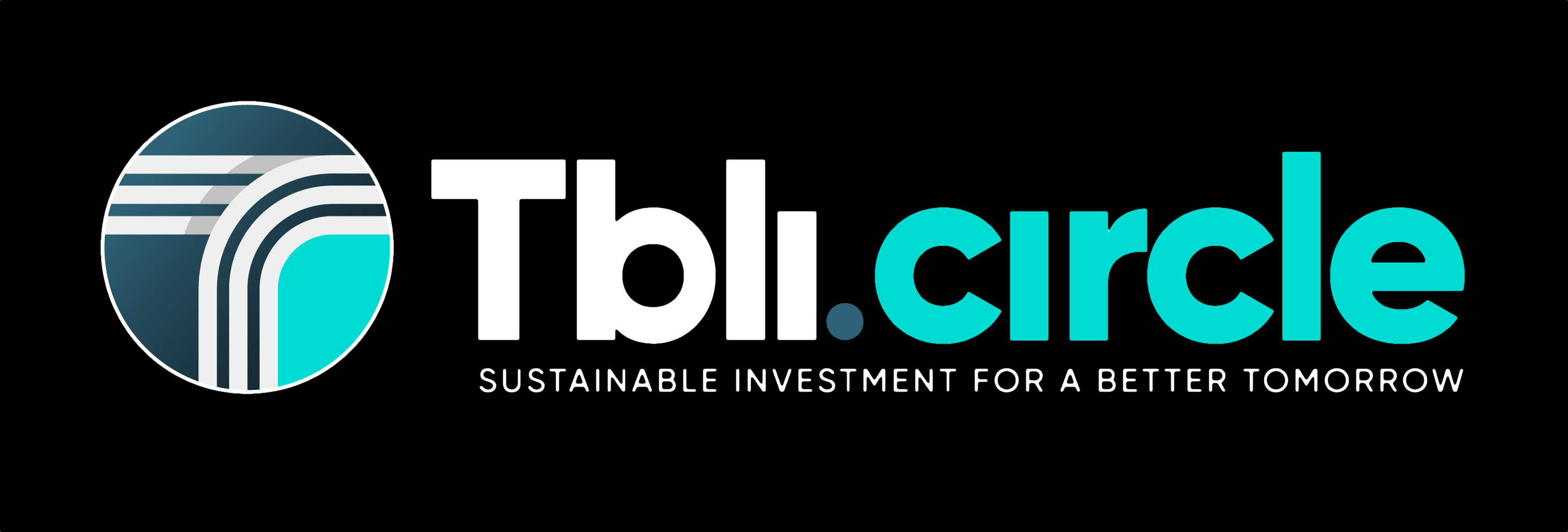
Unleash Your Impact Potential with TBLI Circle
Find your purpose, achieve powerful results, and experience a transformative journey you can't navigate alone. Connect with inspiring individuals who will support you and empower you to reach your goals. TBLI Circle: Where Purpose Meets Possibility.
TBLi Group Announces Opening of New Representative Office in Hong Kong

*Hong Kong, August 27th, 2024* – TBLi Group, a global leader in sustainable investment and ESG (Environmental, Social, and Governance) consulting, is pleased to announce the opening of its new Representative Office in Hong Kong. This strategic expansion reflects the company’s commitment to strengthening its presence in the Asia-Pacific region and providing enhanced services to its growing client base across the region.
The Hong Kong office will serve as a key hub for TBLi Group’s operations in Asia, enabling the company to better support its clients with localized expertise in sustainable finance, ESG integration, and impact investing. As the demand for sustainable investment solutions continues to rise across Asia, TBLi Group’s new office will be instrumental in driving growth and fostering stronger relationships with partners and clients in the region.
Sam Rubinstein, Managing Director of TBLi Group, commented on the expansion, stating, “We are thrilled to establish a Representative Office in Hong Kong, a vibrant financial center and gateway to Asia. This move aligns with our vision to be at the forefront of sustainable finance and ESG consulting in the region. Our presence in Hong Kong will allow us to provide more tailored and timely support to our clients, helping them navigate the evolving landscape of sustainable investing and ESG compliance.”
Hong Kong’s strategic location, coupled with its status as a leading global financial center, makes it an ideal base for TBLi Group’s expansion into Asia. The new office will be instrumental in enhancing the company’s capabilities in delivering cutting-edge solutions that meet the unique needs of Asian markets.
The opening of the Hong Kong office marks a significant milestone in TBLi Group’s global expansion strategy. With a strong foundation in Europe, the company is now poised to leverage its expertise and experience to drive sustainable growth in Asia.
TBLi Group’s Hong Kong office will be fully operational from September 1, 2024. For more information or to schedule a meeting with our team in Hong Kong, please contact us at info@tbligroup.com or visit our website at www.tbligroup.com.
**About TBLi Group**
TBLi Group is a leading global consultancy specializing in sustainable investment and ESG integration. With a mission to promote responsible investment practices and drive positive social and environmental impact, TBLi Group provides comprehensive advisory services to institutional investors, corporations, and governments. The company’s expertise spans across sustainable finance, impact investing, ESG strategy development, and corporate sustainability.
**Media Contact:**
Sam Rubinstein
Managing Director
TBLi Group
Email: sam@tbligroup.com
Phone: +8527073 2564
Website: www.tbligroup.com
Are Exclusions On The Way Out for ESG and Sustainable Funds?
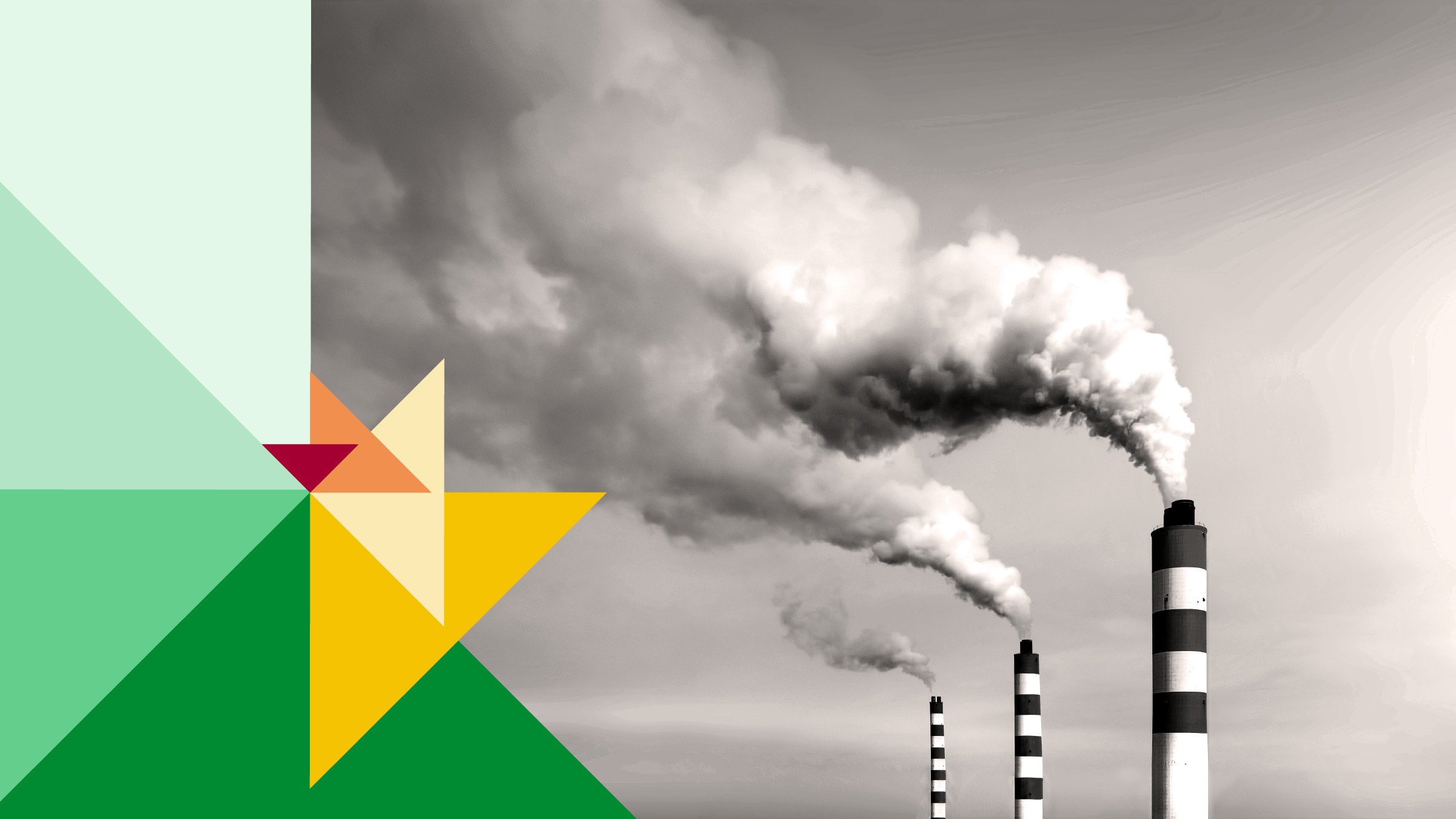
Not so fast. Omitting stocks is popular with a wide range of investors, including Europeans and fossil-fuel-free fans.
Exclusions, or removing certain industries from your investing universe, are a cornerstone of sustainable investing. They solve the vexing problem of investing according to one’s values. In fact, the earliest socially responsible funds, precursors to today’s environmental, social, and governance funds and sustainable funds, excluded investments in companies the founders felt contributed to the Vietnam War.
Today, exclusions are just one in an array of sustainable investing approaches that seek to deliver competitive financial results while also driving positive ESG outcomes.
Lately, some investors are thinking twice about those screens. Recently, Parnassus Investments, which runs $30 billion Parnassus Core Equity PRBLX and other large sustainable funds, decided to drop exclusions, including nuclear power investments, alcohol, weapons, and other investments, affecting dozens of companies.
Other sustainable investors have made similar moves. But screening out investments is alive and well among European investors, those seeking fossil-fuel-free portfolios, and others. Consider the so-called “sin stocks” around pornography, gaming, and tobacco. These remain land mines for many investors.
How Exclusionary Investing Came About
Exclusions were invented when data about companies was more scarce. As information improved, the next stop was hurdle rates: looking at percentages of revenue devoted to a particular controversial product. Today, the world is awash in data about ESG factors such as greenhouse gas emissions or company performance based on Equal Employment Opportunity Commission metrics. That makes it easier for an active manager to find good companies, as she defines them, without using exclusions.
Parnassus had “dozens of conversations” around tossing the screens and discovered that most people no longer viewed them as the foundation for sustainable investing, says Marian Macindoe, managing director of Parnassus’ sustainable investment strategy. So it dropped the exclusionary language from its prospectus and put the stocks it would have omitted onto a “caution” list. An analyst who feels very bullish on a stock can lobby Macindoe and Parnassus’ chief investment officer Todd Ahlsten to remove it from the list. (Companies can also get off the list if their product line has changed or if their risk management around that product is vastly superior to their peers.)
Morningstar analyst Stephen Welch writes, “Doing away with [the exclusions] won’t materially impact how [the funds] are run … This does not mean [Parnassus] will suddenly invest, for example, in tobacco companies, but it could invest in a company that potentially derives more than 10% of revenue from a previously excluded industry as long as it’s not a core risk for the business (10% was the previous threshold for exclusion). For example, this could include an investment in an oil-services company that is actively working to decarbonize and/or working on measurement and diagnostics.”
Read full article
Washington solar project paused amid concern about Indigenous sites
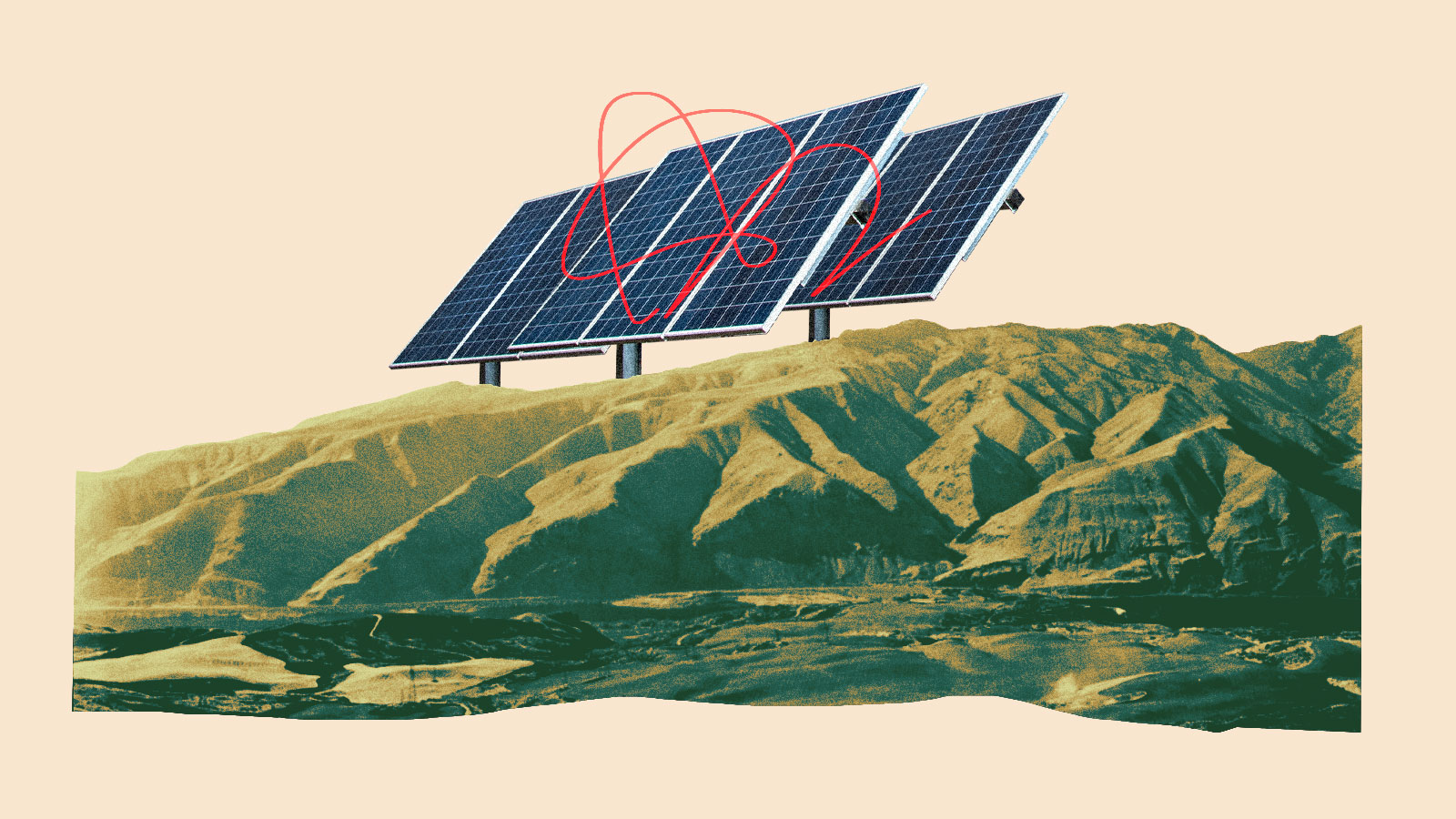
By: B. ‘Toastie’ Oaster
Avangrid Renewables said it plans to review comments from tribal nations and private landowners.
A company developing an industrial-scale solar panel array on Badger Mountain in Eastern Washington has paused permitting activities on the project amid concerns about impacts to Indigenous cultural sites.
The decision comes on the heels of an investigation by High Country News and ProPublica this year, which found that a land survey funded by the developer, Avangrid Renewables, had omitted more than a dozen sites of archaeological or cultural significance on the public parcel included in the project area. This survey is required by the state before it can permit the project so construction can begin.
In a June 27 letter to the state agency responsible for approving the project, Avangrid wrote that it will be pausing project planning for two to three months “while we re-evaluate public comments, including from our project landowners and affected tribal nations.”
The Confederated Tribes of the Colville Reservation have objected to the Badger Mountain solar project for years, according to tribal business councilmember Karen Condon. They officially registered their opposition in May 2023, citing the foods, medicines, archaeological heritage sites, and other cultural resources found on the mountain. They were joined shortly after by the Confederated Tribes and Bands of the Yakama Nation. Both tribal nations have the right to access and use public lands in their ancestral territory, which includes the state-owned parcel on Badger Mountain.
Due to concerns from tribal nations and state agencies, the Energy Facility Site Evaluation Council, whose members are appointed by the governor, had previously ordered a redo of the cultural resources survey.
“While we are pausing permitting activities, Avangrid is continuing to evaluate other elements of the Badger Mountain project,” a company spokesperson said in an email to High Country News and ProPublica.
The future of the Badger Mountain solar project is unclear. Avangrid’s spokesperson wrote, “We have a strong relationship with [Washington’s Department of Natural Resources] on our operating projects and value their participation in advancing clean energy in the state and will continue to work with them to advance new clean energy projects.”
The Department of Natural Resources, which acts as the landlord for the parcel and evaluates the environmental and cultural impacts of projects on it, said the pause is a chance to have more discussions with tribes and potential stakeholders. “Each time people [go] out to the area, more and more archaeological sites and plant resources are seen and more concerns arise,” Louis Fortin, scientific consultation manager at the department, wrote in an email to High Country News and ProPublica.
Fortin noted that some leases with private landowners expired in December 2023, and that some of the landowners are not renewing those leases. The majority of the project is on private lands, suggesting that a major portion of the project may no longer be viable for reasons unrelated to cultural resources. Avangrid declined to answer inquiries about private landowners’ concerns.
Hot and alone: how US cities work to protect isolated people in heatwaves
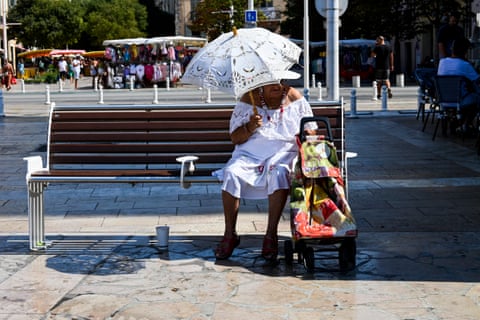
Data shows people living alone were more likely to die in recent periods of unusually intense heat around the world
The dangers of extreme heat can be amplified by social isolation, experts have warned, with those living alone found to be most likely to suffer.
“Heatwaves are deadly,” Eric Klinenberg, a sociologist at New York University who studies climate disasters, once said. “Cold societies make them far more lethal.”
Data shows people living alone were more likely to perish in Europe’s record-breakingly hot summer in 2022 and 2021’s US Pacific north-west heat dome. Klinenberg documented a similar phenomenon back in 1995 while covering a deadly heat event in Chicago, when temperatures soared to 106F (41C) over the span of five scorching days, and more than 700 people died.
During the heatwave, Black people, poor people and the elderly were most likely to die, he found – and so were people who were socially isolated, living alone and without a close social circle who could frequently check on their wellbeing.
“Hundreds died alone behind locked doors and sealed windows that entombed them in suffocating private spaces where visitors came infrequently and the air was heavy and still,” Klinenberg wrote in his book 2002 book Heat Wave: A Social Autopsy of Disaster in Chicago.
Klinenberg told the Guardian that by conducting “organized outreach” to the elderly, the isolated, the chronically ill, and those without air conditioning, they can help shield people from the worst impacts of extreme heat.
“City agencies can make phone calls, work with local community organizations, even ask community police officers, home health aides, and home meal delivery workers to knock on people’s doors and tell them how to stay safe,” he said.
Heat illness, he added, can be difficult to recognize in one’s own body, making isolation all the more dangerous.
“It’s hard to distinguish between ordinary heat and discomfort and truly dangerous conditions, like heat stress and hyperthermia,” he said. “Being alone means there is no one watching you and telling you that you look like you need help. In too many cases, that help comes too late.”
As heatwaves become more frequent due to climate breakdown, some cities are beginning to take these findings into account.
In New York City, the health department, inspired by Klinenberg’s research, in 2020 created the Be a Buddy program to strengthen social bonds and improve public health. Through the programme, community organisations in three low-income neighbourhoods gather volunteers to develop relationships with elderly neighbours, especially those who live alone, lack air conditioning and have chronic health or serious mental health conditions. When the mercury peaks, volunteers check on these residents.
In depth: Pakistan’s Kashf Foundation on empowering women and building a sustainable future
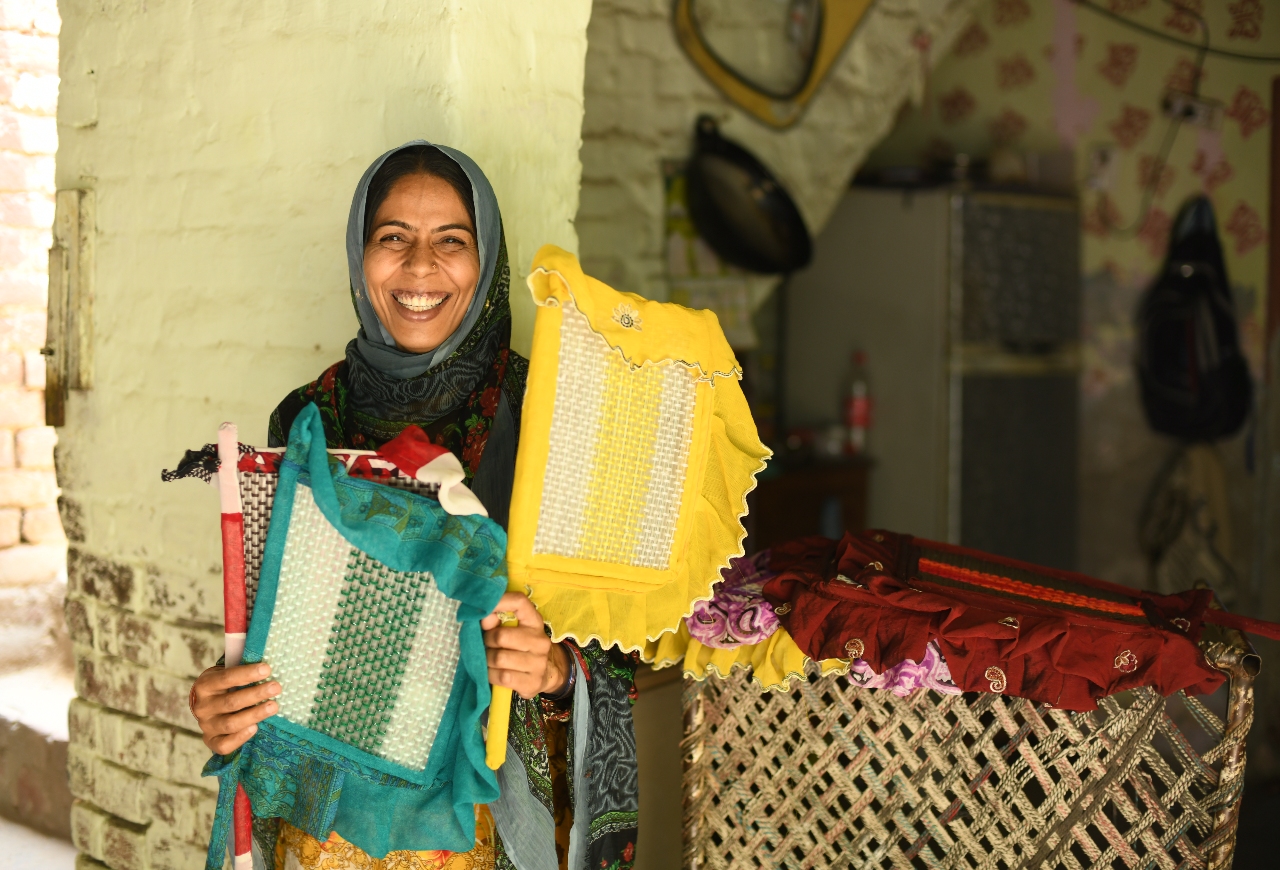
Kashf Foundation is working in a holistic way to do more than just deliver microfinance solutions. It wants to change mindsets, says its founder and managing director, Roshaneh Zafar.
In a small, closely knit neighbourhood in Karachi, three women are navigating complex personal lives. Qurrat, Seema and Bano are facing a range of challenges, from infertility to surviving in a world of rising inflation, debt, and continued societal and cultural expectations. Children play a large role in different ways – from the pressure to have them, to the impact of having too many, to the heart-wrenching practice of child abandonment. All the while, Karachi’s energy crisis impacts the women and their families on a daily basis, as does the country’s economic woes.
Qurrat, Seema and Bano are not real people, however. They are fictional characters in a mini-drama series produced by Pakistani women-focused microfinance institution Kashf Foundation. The series, which aims to raise awareness about the impact of population growth and its impact on physical and mental wellbeing, has reached over 14 million unique users across the country, and generated 36 million impressions globally via TikTok.
It is part of a multi-pronged approach by Kashf – which is supported by a large number of European and other development finance organisations and investors – to make an impact. Investors and financing for the institution comes from British International Investment, Finnfund, FMO, Proparco, OeEB, Symbiotics Investments, BlueOrchard, Incofin and others, with 53% of onlending sourced from foreign investment.
“The first thing we needed to navigate was not microfinance. The real challenge was around changing mindsets. How do you unravel the patriarchy, and how do you ensure that a woman can use her loan effectively and that she has control over the income that she earns?” says Roshaneh Zafar, founder and managing director.
Humble beginnings
Zafar launched Kashf – regarded as the first microfinance institution in the country – in 1996. A former economist with the World Bank, she was inspired by the work of Nobel Prize-winning Muhammad Yunus, founder of microcredit pioneer Grameen Bank in Bangladesh, and more recently interim leader of the country’s new government. Yunus had invited Zafar to visit Bangladesh and come and see Grameen in action, and in fact encouraged her to set up Kashf.
“I spent ten weeks traveling the length and breadth of the country, learning from Grameen families, the staff, and the beneficiaries. Then Dr Yunus called me into his office and over tea told me that I wasn’t needed to make a difference in Bangladesh, but that I was needed in Pakistan. He gave me a loan of ten thousand dollars to use as startup capital, payable in five years.”
Zafar went back to Pakistan and spent a year learning from other organisations in South Asia, before launching Kashf with three other women from one room in her father’s office. Kashf is now 4,500-strong with a staff that has achieved gender parity. It has served and trained over seven million female micro-entrepreneurs and disbursed PKR272.5bn (€883.4m), with participants seeing a 62% increase in business income and a 46% rise in profits after loans and training. Financial beneficiaries have also been able to significantly improve their financial literacy, with half able to open bank accounts.
Read full article
